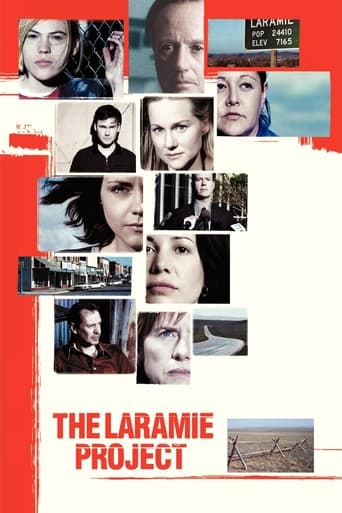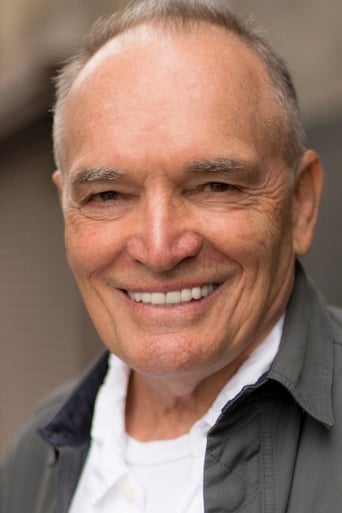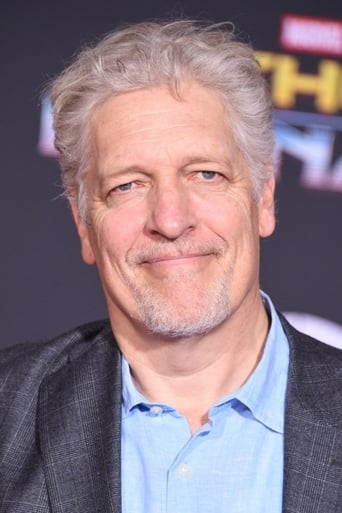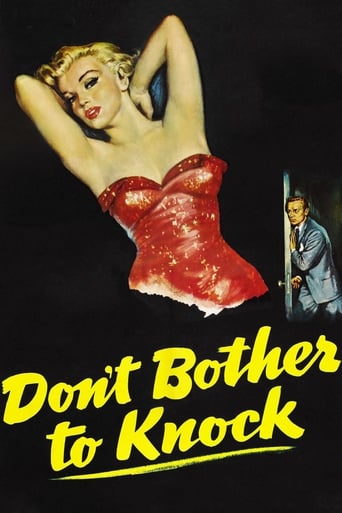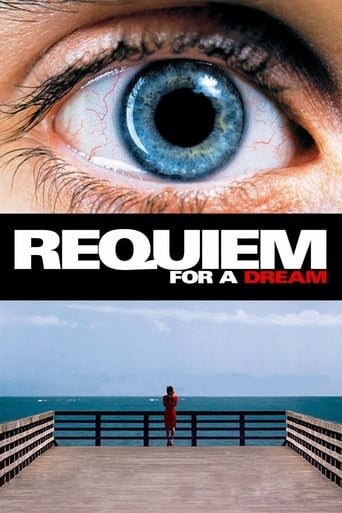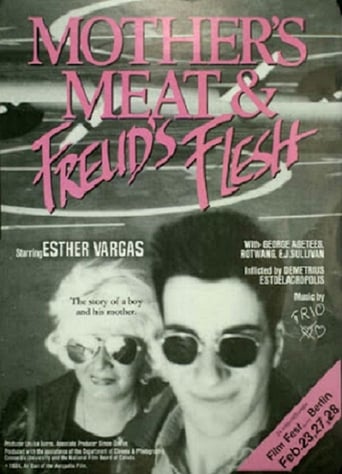The Laramie Project (2002)
"The Laramie Project" is set in and around Laramie, Wyoming, in the aftermath of the murder of 21-year-old Matthew Shepard. To create the stage version of "The Laramie Project," the eight-member New York-based Tectonic Theatre Project traveled to Laramie, Wyoming, recording hours of interviews with the town's citizens over a two-year period. The film adaptation dramatizes the troupe's visit, using the actual words from the transcripts to create a portrait of a town forced to confront itself.
Watch Trailer
Cast
Similar titles
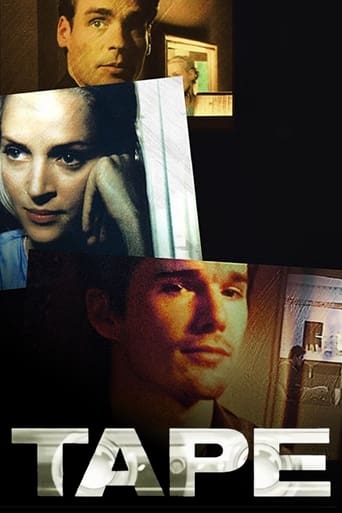
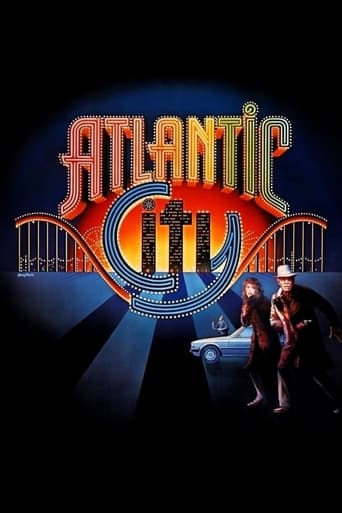
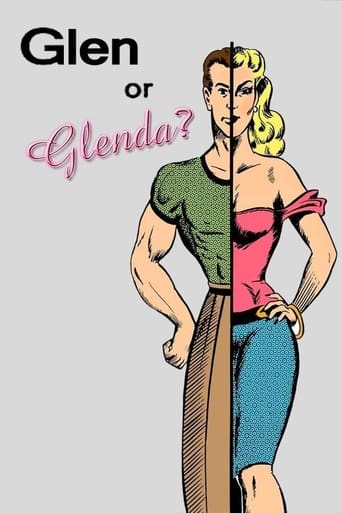

Reviews
Simply A Masterpiece
Awesome Movie
Funny, strange, confrontational and subversive, this is one of the most interesting experiences you'll have at the cinema this year.
What begins as a feel-good-human-interest story turns into a mystery, then a tragedy, and ultimately an outrage.
The Laramie Project is a film rendition of a play by Moises Kaufman. This play was generated with the assistance of ten members of the Tectonic Theater Project who went into Laramie, Wyoming and conducted two hundred interviews with all types of people of all ages, occupations and opinions from Laramie. The interviews consisted of their opinions and reactions to the events that occurred regarding a young man named Matthew Shepard. On October 6th, 1998, Matthew Shepard, a twenty-one year old student at the University of Wyoming, received what he thought was just a friendly ride home but in actuality turned out to be the beginning of the end of his life. The two young men who offered him the ride, Laramie residents Aaron McKinney and Russell Henderson, drove Matthew into the middle of a field and proceed to beat and torture him and then left him there to die, tied up to a fence. Matthew was found the next morning however, by then it was too late, he was permanently in a coma and died a few days later in a Colorado hospital. Matthew was an openly gay man and this crime is thought to be motivated by his sexuality and both McKinney and Henderson's distaste for homosexuals leading it to be tried in the court as a hate crime. I believe that watching this film as a bisexual woman allowed me to see this film through a different lens where I pick up on certain topics that otherwise may have gone unnoticed. First and foremost, my favorite part of this film is its real and raw genuineness. Majority of films based on historical events are embellished upon and words are changed around to create a certain mood or create a better or more appealing film but the Laramie Project is reenactments of interviews in which the recordings of the interviews themselves are used as the scripts. Very few words are changed like when Reggie mistakenly says "ATZ" instead of "AZT" when speaking about her preventative medication, they did not correct it as to stay true to the words of the people. One could critique that this film has some slow scenes but I do not judge these scenes because it demonstrates the reality rather than embellishment that makes this film so good. This film does not portray a lot of gay people since they were getting a wide variety of people to interview however, they did have a few. Where viewers can best see Laramie's opinions towards gay people is when the camera is focusing on the members of the Theater Project such as when they were sitting in the diner and their reaction to their waitress as well as the encounter that cast member Amanda Gronich had with the reverend outside when she stated her disbelief in his comments and how she could let him say such a thing to her. This film did portray many examples of allies which, as a member of the LGBTQ community myself, I found to be very powerful. Both the "Angel Action" protest and the homecoming parade when it grew to be at least five times the size of the group that started the parade because people continued joining in in order to support and stand with each other in honor of Matthew. Overall, to me this film was extremely powerful and thought provoking. It did not leave me with a feeling of guilt in a 'I could do more to help those around me' but rather challenged me to first off, be careful, because being a member of the LGBTQ community is not always the safest when you are open about it because there are many people out there who do not believe that it is right. Secondly, it served as a call to action to be an ally, which I think can be shown to any person despite their sexual preferences or walks of life in order to encourage everyone to be there and support those in their community who need it most. Thirdly and finally, this film made me begin to think more into the legal system and politics regarding LGBTQ rights and what types of laws can come about to serve justice to people who commit such crimes such as anti-discrimination legislation or hate-crime punishment which is not something I was not well versed in prior to seeing this film. Grade = A-
As a viewer, new to this story and type of storytelling, I felt a bit over biased. I realize that instead of focusing on the death and life of Matthew Shepard, Kaufman, focused on the collective voice of the town, which was nothing but a bag of mixed messages. As I sat, thinking about this film over the course of several days, that is the only issue that I had trouble grappling. This was an emotional film, chalk full of actors giving surprising monologues about their personal opinions as we collectively watch the aftermath of such a horrid crime. We even get the chance to see how the death of Matthew Shepard caused an ill fate to another person within the community. Again, these side stories were powerful to watch because it gave a living soul to the town, but where The Laramie Project went a bit too far was the over-dramatic nature of the characters.While I would agree that there was probably some emotion behind those that chose to take part in the interviews, I don't believe you would find such a doctor, with such a dramatic "umph" saying, "We take offense to this murder", like no other than Peter Fonda could say it. Christina Ricci, in my eyes, was the embodiment of my last statement. Perhaps Kaufman, would have benefited more by placing unknowns in the roles instead of these name Hollywood players. While they were not A-grade actors, they each did a phenomenal job in this film but oddly, this was the problem. Steve Buscemi speaking about his relationship with Shepard made me see Buscemi being Buscemi. I didn't see the character that he was playing. I didn't see Fonda's doctor's character. I didn't see anything of value behind Ricci's character (outside of a definite Ricci being Ricci) and while I realize that this was not a work of fiction, without the development of a known character, they were just actors speaking powerful lines. The lines stood on their own, and it was those lines that continued my attention through the film. Alas, I could not see Joshua Jackson (from Dawson's Creek) as the actual bartender or Dylan Baker as the head of the hospital because I knew these actors. I wanted better from them. The most emotional speeches came from those that I was not fully familiar with. Those like the man who watched the parade route, or the actor that played Matthew Shepard's father. These smaller, unknown bits, was what made The Laramie Project stand out and break a tear out of even the strongest wall.I want to express again that I thought that this was a very powerful film; there were just certain moments that were using cliché elements to heighten the emotion of the story. This wasn't needed in the least bit. While I know that having the media attention when the residents of Laramie walked out of the courtroom was surprising, the film technique used to demonstrate this seemed cheap, and nearly like a low blow to the story. The glossed effect of when Ricci's character, and her mother, made angels to block the words of protesters, seemed fake on screen while perhaps actual footage of this event would have strengthened the emotion. Perhaps I am asking too much, but when Ricci walks out with those angel wings flying high, I just expected Will Smith to come out of nowhere, screaming a line that would surely demonstrate to those protesters who was in control here. It came out a bit too Hollywood. As well as the scene where Dylan Baker cries, which I felt was the better of all the cinematic moments. It was powerful, yet subdued. It could have used more realism. Am I complaining too much? Nope, because I thought this was a brilliant film with how unique it was with its portrait of storytelling. I liked hearing the voices, in fact, if this were a story on CD, it would be a personal favorite, but because we were distracted by images of famous actors speaking in their own voice as well as unclimactic cliché scenes, it softened the blow. I was still teary at the end, but this could have been a film to rival that of Angels in America had it just tried a bit harder to avoid the Hollywood influx and paint a more vivid portrait of your average American town.Overall, I must admit, it took me several days for this film to settle, but I think I could view it again. I especially would like to see Amy Madigan's performance, which I thought, her struggle with what happened, nearly overshadowed what happened to Matthew Shepard. I could have watched an entire film based solely on her. It is amazing what the media chooses to cover, and what they choose to ignore. I like what this film demonstrated. I like that it didn't depict this Wyoming town of rednecks and hillbillies never quite understanding what was wrong with the murder of Shepard. I am glad that we were able to see humanity break through the barriers and show emotion, show sadness, and look beyond the lifestyle to see the human being that was wrongly sentenced. I do think, nonetheless, that liberties were taken with certain actors and certain camera shots, but overall that can be overlooked. By throwing in some unknowns to this picture, I think the drama and the intensity of the event could have been heightened. This is a sad thing that happened, and I am glad that Hollywood chose to open the envelope, but they just didn't give it that final seal of approval. Actors were actors and cliché moments were used to build emotion. You already had a sad story; we didn't need the charades to improve it. I strongly suggest watching this film.Grade: **** out of *****
This film is good, but it contains the same fundamental mistakes as the play: 1. It attempts to beat acceptance in to the head of it's viewers when, in reality, most of those who would view this are already tolerant towards those who are different. It emphasizes over and over the importance of tolerance, spends too much time trying to portray the same emotions in different character, and attempts to make the murder of Matthew Shepard worse than any other murder. All murders are hate crimes. All hate crimes tear communities apart. 2. It doesn't properly explore the murder. It automatically makes the murder a hate crime which, as I do not know all the facts, I cannot properly say whether it was or not. It doesn't allow for the audience to make up their own mind, and takes the views of only a select few. From many accounts that were not included in the play/movie, other factors came into play (money, the attackers's molestation as a child, drugs, etc.) that could greatly change ones opinion if they were included, or if they were mentioned more than just once. Of course, the familiar faces that pop up in the movie so often don't exactly add to it's effect. Overall, the message is a great gift, even if the wrapping is a little shoddy. Worth watching at least once.
A young gay man brutally killed by two young men trying to make a point about their hatred of homosexuals is the basis of Moises Kaufman's brilliant play seen here a few years ago. On the stage the play is somewhat detached because of the limitations in the text, but as a film, adapted for the screen by Mr. Kaufman, the immediacy of the story is more shocking than in the theater."The Laramie Project" is seen in a documentary fashion. The director and his assistants went to Laramie to investigate the incident that caused a world wide uproar because of the savage way Matthew Shepard's death had caused. In recreating the facts, Mr. Kaufman has dramatized the story by having real actors play the different people in town with whom he and his collaborators talked during the days of the research trip.What comes out about the story is that individually, the citizens of Laramie were as shocked as everyone else was. After all, they considerer themselves as pretty tolerant, so why a horrible tragedy like this could ever happened amongst them? In fact, it only takes a pair of misguided individuals, who think thought they would make a statement by inflicting on the unsuspecting Matthew Shepard a punishment he didn't deserve.The ensemble cast that play the different parts is an inspired choice. Mr. Kaufman was lucky in amassing such talent that respond so well to his commands. Steve Buscemi, Camryn Manhein, Laura Linney, Amy Madigan, Frances Sternhagen, Christina Ricci, Margo Martindale, Kathleen Chalfant, Terry Kinney, just to name a few, give excellent readings about what really occurred in Laramie.Ultimately, Mr. Kaufman makes his point by just letting the citizens of Laramie come to terms with the horrible tragedy that shook their town.
